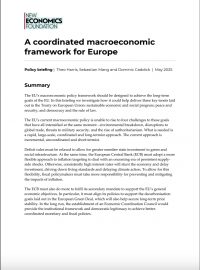A coordinated macroeconomic framework for Europe

EU macroeconomic policy in an age of shocks and the case for monetary-fiscal coordination
The EU’s macroeconomic policy framework should be designed to achieve the long-term goals of the EU. In this briefing we investigate how it could help deliver three key tenets laid out in the Treaty on European Union: sustainable economic and social progress; peace and security; and democracy and the rule of law.
The EU’s current macroeconomic policy is unable to rise to four challenges to these goals that have all intensified at the same moment — environmental breakdown, disruptions to global trade, threats to military security, and the rise of authoritarianism. What is needed is a rapid, large-scale, coordinated and long-termist approach. The current approach is incremental, uncoordinated and short-termist.
Deficit rules must be relaxed to allow for greater member state investment in green and social infrastructure. At the same time, the European Central Bank (ECB) must adopt a more flexible approach to inflation targeting to deal with an oncoming era of persistent supply-side shocks. Otherwise, consistently high interest rates will stunt the economy and delay investment, driving down living standards and delaying climate action. To allow for this flexibility, fiscal policymakers must take more responsibility for preventing and mitigating the impacts of inflation.
The ECB must also do more to fulfil its secondary mandate to support the EU’s general economic objectives. In particular, it must align its policies to support the decarbonisation goals laid out in the European Green Deal, which will also help secure long-term price stability. In the long run, the establishment of an Economic Coordination Council would provide the institutional framework and democratic legitimacy to achieve better-coordinated monetary and fiscal policies.
Image: iStock
neweconomics

 Download the report
Download the report 



